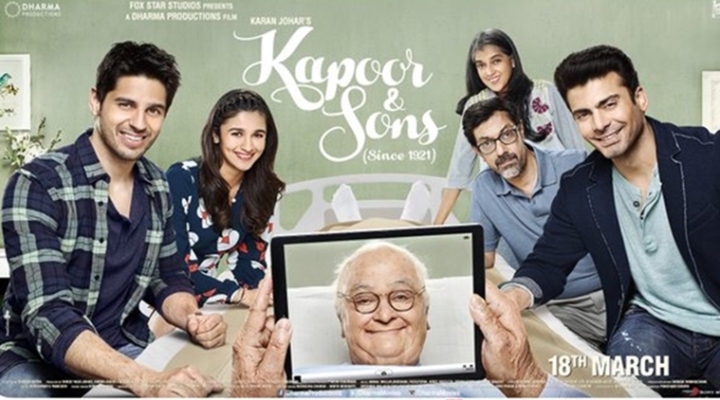
Shakun Batra’s “Kapoor & Sons” (2016) is the latest example of how Bollywood’s portrayal of the family is changing dramatically.
The film is about the Kapoors, living in Tamil Nadu’s Coonoor hill station (nobody knows how these Punjabis landed there). The husband and wife (Rajat Kapoor and Ratna Pathak Shah) play a perennially quarrelling married couple, who have differences over money, or the lack of it; the man’s alleged closeness to a certain Anu aunty that eventually turns out to be an affair; and his opposition to his wife’s plans of starting her own bakery. Also bring in a wacky, horny (despite being seriously unwell), eager-to-die and over-the-top grandfather in the name of Rishi Kapoor; and his cantankerous grown-up grandsons (Fawad Khan and Siddharth Malhotra) who are not fond of each other either; a love angle between Malhotra and Alia Bhatt; and a gay man (Khan) being “outed” by his mother when she looks at his laptop.
That pretty much sums up the film that shows extremely high-decibel fights between family members who don’t seem to agree on anything and have skeletons in their cupboard that invariably tumble out towards the end.
The fights are ugly, nearly breaking down an institution long glorified in Hindi cinema – say thanks to the Sooraj Barjatya school of film-making, for example, with their modern-day Ramayana like too-good-to-be-true characters.
“Kapoor & Sons” can be seen as an extension of “Dil Dhadakne Do” (2015), Zoya Akhtar’s family drama that’s set on a cruise during – don’t miss the irony – the wedding anniversary celebrations of an unhappily married couple (Shefali Shetty and Anil Kapoor) . Their dysfunctionality peaks when, in the end, they spar bitterly that is made to look like a slugfest between family members probably not shown before in Bollywood.
Add “Piku” (2015) – a funny film about a single woman (Deepika Padukone) and her potty-obsessed, irritable father (Amitabh Bachchan) – to this list of heightened family melodramas and you realise that in the depiction of present-day urban family situations there is so much that is unsettling. If it is unsettling, it is probably true and in that these films also hold a mirror to our lives. But these films seem to suggest that the mask of utopia seen in the portrayal of families, especially towards the climax of many films in the past, has come off.
Of course, children rebelling against the family and discordant relationships have been done-to-death themes in Bollywood. There are umpteen examples, but to name a few the following come to my mind: “Qayamat Se Qayamat Tak”, “Dilwale Dulhaniya Le Jayenge”, “Dil”, “Maine Pyaar Kiya” etc.
These films are a far cry from the day when Amit (Amitabh Bachchan) in “Kabhi Kabhie” and “Silsila”, Yash Chopra’s large-scale and his most famous romances till date, would put family honour and duty above his relationships with Pooja (Rakhi) and Chandni (Rekha) in both the films.
“Humein koi haq nahin pahunchta ki hum apni khushi ke liye apne maa baap ke armaanon ka gala ghont dein, unki lashon par apne pyaar ka mahal banayein,” he tells Pooja as she is about to marry Shashi Kapoor in “Kabhi Kabhie”.
To put it less melodramatically, these lines simply mean – we have no right to put our dreams over our parents’.
In another Chopra production with a typically ensemble cast, “Waqt” (1965), the reunification of Lala Kedarnath (Balraj Sahni) and family, who are torn apart by an earthquake, is the underlying theme and the eventual aim of the film. Ten years later, in “Deewar”, Bachchan’s now-institutionalised dialogue “Mere paas maa hain” simply shows the premium Bollywood stories gave to the representation of the family and its celebration.
In the late 1980s, just on the cusp of India’s liberalisation and the subsequent advent of modernity, “Sansar” (1989) would talk about the difficulty of a joint family sticking together because of a showdown of egos and varied interests. In “Avtaar” (1983), Shabana Azmi and Rajesh Khanna play an older couple, who are neglected by their children. In the end, Avtaar (Khanna) dies of a heart attack and leaves the will in the name of his wife Radha.
Somewhat inspired by this Mohan Kumar film, among other influences, “Baghban” (2003) would attempt the same – disown the children who don’t look after their parents. The final speech of Amitabh Bachchan speaking of his hurt as a neglected father is part of the comparatively lesser-heard perspective of the older generation about their children.
Now, dialogue in films like “Kapoor & Sons”, “Dil Dhadakne Do” and even “Piku” show the acrimony has acquired a shrillness and madness not seen earlier. Whatever little was left of the gentleness and covert questioning has vanished completely, making way for a filial discord that is unabashedly in-your-face.
Perhaps, upcoming film R Balki’s “Ki and Ka”, starring Kareena Kapoor and Arjun Kapoor, may provide some comic relief from the non-stop ghar ghar ki kahani in showing a full-time “house-husband”, whose wife is “the man” in their marriage.
Good one. I loved the film and watched it before reading this, but you might have revealed some spoilers.
LikeLike
thanks sir!
LikeLike